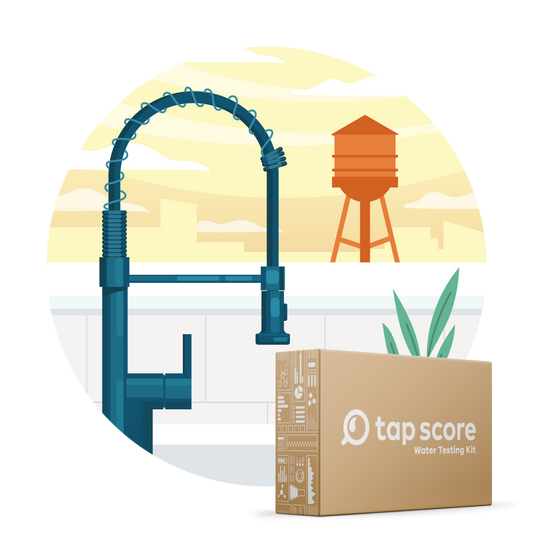
What Are VOCs and Are They in Your Drinking Water?
Our blog is written by real experts— not AI. Each guide is carefully reviewed and updated based on the latest research. Plus, with no affiliate links, you can count on unbiased insights you can trust.
Volatile organic compounds (VOCs) are a group of chemicals increasingly found in drinking water that can cause a range of health effects—including cancer. [1]
VOCs are used everywhere from industry, agriculture, transportation, and in day-to-day household products. Unfortunately, once these chemicals contaminate local groundwater, they are difficult to remove. We’ll go over what VOCs are, where they’re found, how to detect VOCs, health risks, and what you can do to protect your water.
What Are Volatile Organic Compounds (VOCs)?
VOCs are carbon-containing compounds with properties that allow them to easily evaporate and move between the air, soil, surface water, and groundwater.[2]
We encounter VOCs all the time in daily life as additives in gasoline, paints, varnishes, and cleaners. Many familiar chemical-related smells—like a freshly painted wall or an uncapped permanent marker—are actually scents caused by VOCs. They have several commercial and industrial uses including the manufacturing of automobiles, electronics, and plastics.[3]
According to a 2006 U.S. Geological Survey study, 90 of 98 aquifers nationwide tested positive for at least one VOC.[4]
The most frequent detections occurred in California, Nevada, Florida, as well as the New England and mid-Atlantic states.
How Do Volatile Organic Compounds Get into Drinking Water?
VOCs easily dissolve and leach into groundwater, and most VOCs found in drinking water are caused by human activity.
Because VOCs spread easily and are long lasting, private wells located near industrial or commercial areas, gas stations, landfills, railroad tracks or farm fields can be at risk of VOC contamination.[2] These chemicals can enter drinking water systems through leaks, accidental spills, and improper disposal.
The most commonly detected VOC groups include:
- Trihalomethanes (THMs)—like chloroform—which are disinfection byproducts that come from recycling chlorinated waters to aquifers.
- Perchloroethylene (PCE)–also known as tetrachloroethylene–a solvent found in dry-cleaning products, adhesives, spot removers, typewriter correction fluid, shoe polish, printing inks, paint products, and household cleaners.
- Methyl tert-butyl ether (MTBE), a gasoline additive that can contaminate groundwater through leaks in leaking underground fuel storage tanks.
How To Detect VOCs in Water
Many VOCs produce an odor in water, giving off a sweet, gasoline-like, or chemical smell. High concentrations may also result in an iridescent, oily sheen on the surface of your water. However, oftentimes, disinfection byproducts cause no changes to water’s smell, appearance, or taste at all.
Contacting your local utility or public health department is a good first step toward finding out which contaminants may be in your drinking water distribution system.
However, testing is the only way to know the actual concentration of VOCs in water.
When To Test for VOCs in Water
It is always advisable to test your water after any major changes to its taste, smell, or appearance.
VOC Water Test
Test your drinking water for a broad range of volatile organic compounds, including disinfection byproducts related to chlorination.
VOCs in City Water:
If your drinking water comes from a utility/city water supply, it is most likely treated with chlorine to kill any waterborne pathogens. When the chlorine reacts with naturally occurring organic matter in your pipes, various (and potentially carcinogenic) VOCs form as disinfection byproducts. It is strongly recommended that when testing city water a VOC panel is also included.
VOCs in Well Water:
Testing well water for VOCs is recommended at least every 3 to 5 years, though consider more frequent testing if you live near a landfill, factory, gas station, fuel tank, or dry-cleaning operation. VOCs can also be found if your well is located near agricultural, mining, or industrial activity. Alternatively, if you have recently performed a shock chlorination on your well to remove bacteria, it is also suggested you test for VOCs to ensure any lingering chlorine or related compounds have dissipated to safe levels.
VOCs from Plastic Pipes:
Whether you get your water from the city or if you have a private well, if your home has plastic pipes (PEX, PVC etc.), VOC testing is encouraged. Plastic plumbing, which has gained wide popularity in recent years, can leach a range of volatile organic compounds into your water.[5]
Read more about PEX, PVC, and other plastic pipe material: Is Plastic Piping Safe?
What Are the Health Effects of VOCs?
VOCs are a wide variety of chemicals, and their health effects are varied and still the subject of study. However, several VOCs are linked to a range of short- and long-term health risks. Most adverse health effects happen when people are exposed to contaminated drinking water over a long period of time.
The Environmental Working Group lists 12 potentially carcinogenic VOCs (including 9 classified as such by the EPA):[6]
- 1,2,3-Trichloropropane
- Vinyl chloride
- Tetrachloroethylene (PCE or PERC)
- Carbon tetrachloride
- Benzene
- 1,1,2-Trichloroethane
- 1,4-Dioxane
- 1,2-Dichloroethane
- Styrene
- 1,2-Dichloropropane
- Trichloroethylene (TCE)
- Dichloromethane (methylene chloride)
Additionally, animal studies have found MTBE to cause kidney and liver tumors, as well as neurological effects in humans.[7]
VOCs are also linked to other serious health risks like liver, kidneys and nerve damage (for example, toluene, ethylbenzene and xylene).
While the EPA has enforceable limits for 21 VOCs in tap water, these regulations have not been updated since 1992 and are not based on what's advisable for human health.[8]
Read more about how the EPA sets limits for contaminants in drinking water: What Is The Difference Between MCLG and MCL?
Which Filters Can Remove VOCs from Drinking Water?
Once you’ve tested your water and know what needs to be addressed, choosing the right treatment becomes a lot easier.
Every Tap Score Report includes a detailed breakdown of all parameters tested and are presented in any easy-to-understand way–along with health-risk analysis, information about common sources, and how your water’s levels compare to a variety of regulatory and public health guideline thresholds. Each report also includes unbiased treatment recommendations tailored to address any issues found in your water.
It’s important to keep in mind that certain VOCs, like 1,4 dioxane, can only be removed through specialized treatments at the water utility level. But, there are home treatment options available for removing several VOCs.
Do Activated Carbon Filters Remove VOCs?
Many VOCs can be removed with activated carbon filters.
Both POU and POE systems—like pitcher filters or whole-home filtration systems—are effective options, as long as the filter is rated with the NSF/ANSI Standard 53 Certification.
Does Reverse Osmosis Remove VOCs?
Reverse osmosis (RO) systems with a National Sanitation Foundation (NSF/ANSI) Standard 58 Certification can remove many VOCs.
Does Boiling Water Remove VOCs?
Boiling tap water is only effective for certain VOCs, and should not be relied on as a treatment option.[9] Boiling may also cause additional problems by releasing VOCs into the air, creating air quality hazards, as well as concentrating heavy metals.
More Questions About Volatile Organic Compounds in Water?
Contact the Tap Score team of treatment experts, water quality engineers, and chemists any time using the live chat or sending them an email at support@mytapscore.com. They can help answer any questions about VOCs or any other water quality issues that you may have.
Read More
▾Review: Trihalomethanes In Tap Water
Disinfection Byproducts: The Adverse Effects of Water Chlorination
Shock Chlorination: How to Get Rid of Bacteria in Your Well Water
The Ultimate Guide to Well Owner Maintenance
What Is The Difference Between MCLG and MCL?
The Dangers of Dioxane in Drinking Water
Top 4 Most Popular Water Filtration Technologies For Homes
Sources and References
▾- Volatile Organic Compounds' Impact on Indoor Air Quality | US EPA
- Pesticides, Petrochemicals and Other Organic Chemicals in Drinking Water
- USGS Volatile Organic Compounds
- USGS Circular 1292
- Contributions of silane cross-linked PEX pipe to chemical/solvent odours in drinking water
- Tap Water Database | EWG Review of Carcinogenic VOCs in Tap Water
- HEALTH EFFECTS
- Chemical Contaminant Rules
- FACT SHEET







